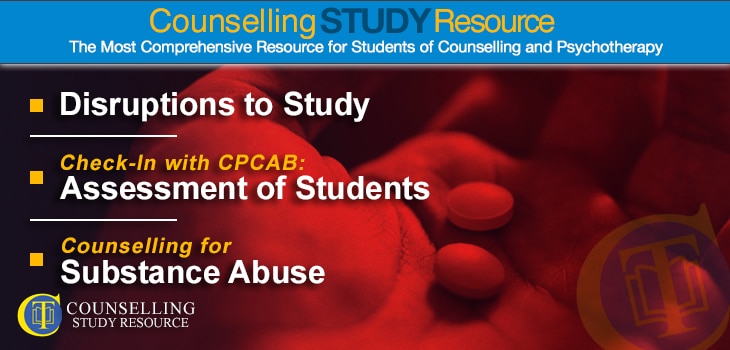148- Counselling for Substance Abuse
Disruptions to Study - Assessment of Students
In episode 148 of the Counselling Tutor Podcast, Ken Kelly and Rory Lees-Oakes talk about students' concerns following the disruption to counselling studies in the COVID-19 pandemic. 'Check-In with CPCAB' then looks at how students are assessed against course criteria. Finally, in 'Practice Matters', Rory interviews counsellor Linda Mather about counselling for substance abuse.
Disruptions to Study (starts at 3.00 mins)
With learning institutions currently closed for face-to-face work due to the COVID-19 pandemic, counselling students may be feeling concerned about how their qualifications will be completed and awarded. This is affecting students at all levels, from level 2 certificates to level 8 doctorates.
Rory seeks to bring clarity to the situation by explaining how qualifications are structured in the UK, and who takes responsibility for what.
In the mid-2000s, the UK government set up independent bodies in each constituent country to oversee and regulate qualifications.
For example, in England, there is the Office of Qualifications and Exams Regulation (known as Ofqual). Rory describes the arrangements for Scotland, Wales and Northern Ireland too.
Awarding bodies are currently awaiting guidelines from the government and these bodies on how they will award qualifications this year. When we find out any updates on what is happening, we will add these to the Counselling Tutor Facebook group.
In the meantime, do keep an eye on the website of your awarding bodies, as you are likely to find COVID-19 updates there.
Rory has written a handout that contains lots of links to help you with this. You can download it here.
You may also like to practise blended learning - the use of online learning to complement and support your college/university learning - and use the CSR to continue your studies.
Check-In with CPCAB: Assessment of Students (starts at 18.50 mins)
Rory talks to Kelly Budd (Head of Qualifications) at CPCAB (Counselling & Psychotherapy Central Awarding Body) about how students are assessed for CPCAB qualifications.
She explains that CPCAB uses three types of evidence to assess whether students meet the criteria:
- documents (e.g. journals, learning reviews, self-reviews, case studies, case presentations, assignments and essays) - in other words, writing produced by the student themselves
- tutor observations (e.g. tutor feedback on skills sessions, on tutorials, on group discussions and on case presentations) - in other words, writing produced by the tutor
- testimonies (e.g. peer feedback on skills sessions, supervision reports, agency reports and statements from agency colleagues) - in other words, writing produced by people other than the student or tutor.
To an extent, centres can choose their own assessment methods - and so it pays to shop around for a centre whose assessment methods fit with your strengths and preferences. For example, do you favour an academic writing-based, a creative or a practical approach to assessment?
You can find more information about CPCAB on its website. CPCAB is the UK's only awarding body run by counsellors for counsellors.
Counselling for Substance Abuse (starts at 31.15 mins)
Counsellor Linda Mather specialises in working with clients who abuse substances.
In this segment of the Counselling Tutor Podcast - aimed at qualified practitioners - Rory talks to Linda about counselling for substance abuse, looking in particular at:
- different forms of substances and their effects
- why people abuse substances
- the differences between physical and psychological addiction
- how to support clients to withdraw safely
- how to help clients manage their emotions effectively in future.
Here in Counsellor CPD, you'll find a lecture by Linda on counselling for substance abuse, including a downloadable slide pack.


